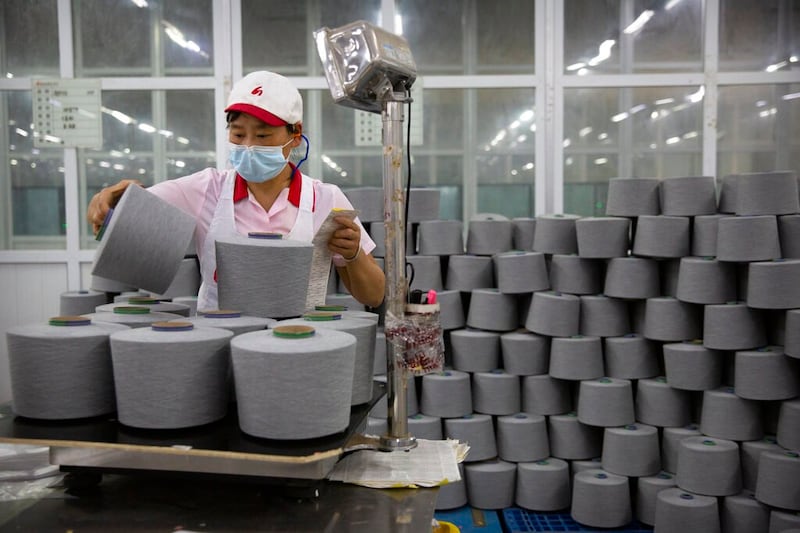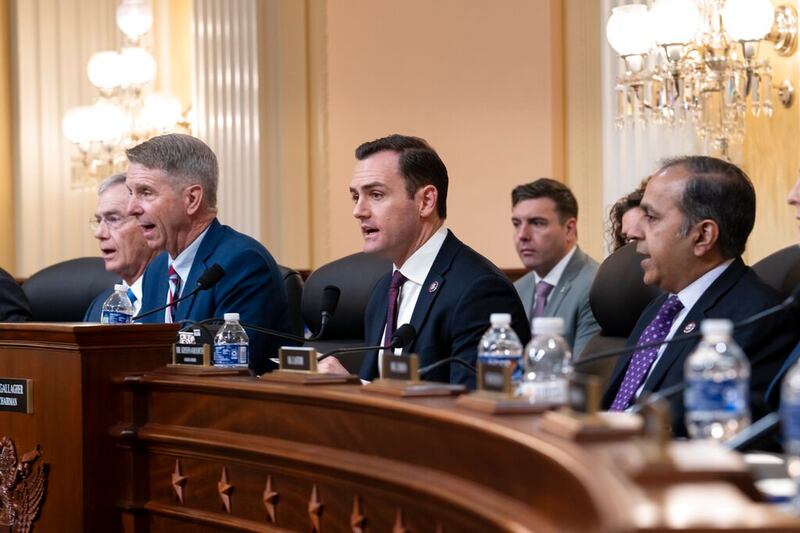The U.S. Congress should remove a loophole allowing apparel websites to sell clothes in the United States made by Uyghur slaves and create a list of foreign manufacturers known to exploit forced labor, the House Select Committee on China said in a report released Wednesday.
The report also recommends that Congress pass legislation funding a public archive documenting China’s genocide of the Uyghurs and for the executive branch to pursue diplomatic efforts to help those who escape the Xinjiang Uygur Autonomous Region find refuge.
Released alongside a sister report offering 10 recommendations to Congress on American policy on Taiwan, the report follows a prime-time hearing about the Uyghur genocide held on March 23 by the special bipartisan panel, established at the start of the year.
The report calls for changes to the "de minimis" threshold for customs inspections, which allows foreign fast-fashion websites to ship their goods direct-to-consumer without being subject to the Uyghur Forced Labor Prevention Act if the package is worth less than $800.

The Uyghur Forced Labor Prevention Act was passed in 2021 and bans the import of any goods that were made using forced labor. More than US$1 billion in shipments have already been prevented from entering the United States under the act, according to official figures.
‘De minimis’ exception
The “de minimis” threshold to customs inspections, though, was increased from $200 to $800 in 2015, the committee report notes.
In the wake of that change, along with “the rise of new online-only retailers” who sell items piece-by-piece to customers, the value of goods entering the U.S. market under the exception has risen from less than $10 billion in 2020 to almost $40 billion in 2021, it said.
“Exploiting the de minimis threshold may be a major avenue through which PRC companies, such as online retail platforms that sell direct to consumers like Shein and Temu, circumvent the Uyghur Forced Labor Prevention Act,” it said, using an acronym for China’s government.
Officials with U.S. Customs and Border Patrol “could not reasonably scrutinize goods sent to the United States from the PRC under the current de minimis rule for concerns about forced labor,” it said.
Besides reducing the threshold, it calls on Congress to provide more funding to the Department of Homeland Security – both “to enforce more rigorously the Uyghur Forced Labor Prevention Act and to make a comprehensive list of all companies complicit in forced labor.”
‘This genocide must end now’
The House Select Committee on China was created after Republicans took back control of the House at last year’s midterm elections.
Although it is led by Rep. Mike Gallagher, a Republican from Wisconsin, the committee has strived to present a bipartisan face, with Gallagher and deputy chair Rep. Raja Krishnamoorthi, a Democrat from Illinois, insisting they are in lockstep on China.

Krishnamoorthi told Radio Free Asia the adoption of the two reports on Wednesday was a clarion call for Congress to act further against the Chinese Communist Party to “end the genocide.”
“The message that we’re trying to send through this report is that the CCP needs to understand that on a bipartisan – and probably bicameral, and indeed in a unified way – we are speaking with one voice that this genocide must end now,” Krishnamoorthi said.
He pointed to the de minimis exception as an area where Congress could act quickly to make a change that would force companies to stop using forced labor if they want to make money in the United States.
“The $800 de minimis exception allows a lot of companies to ship goods that are tainted by forced labor from the Xinjiang region. We received 2 million packages a day from the PRC,” he said, adding that U.S. Customs and Border Patrol would also need more resources.
Taiwan peace and stability
The committee also issued a report titled “Ten for Taiwan,” offering 10 recommendations to “preserve peace and stability” in the Taiwan Strait, after the committee last month engaged in a table-top simulated war game over the island.
Gallagher reportedly justified the game by saying it was important to "put yourself inside your opponent's head and understand their strategic objectives," and concluded any invasion of the self-governing island by China would also include cyber attacks on America.

Drawing on that, the report calls on the United States to produce “additional long-range missiles and unmanned vehicles in the Indo-Pacific region” but warns that “the U.S. defense manufacturing base is not postured to quickly produce the needed numbers.”
It also calls on the United States and Taiwan to train together so they could operate in an “integrated manner,” urges the American government to deliver weapons already promised but not yet delivered to Taipei and notes that “resupplying Taiwan would be difficult in the event of a crisis.”
“At the Select Committee’s Taiwan wargame, we saw the terrifying result of deterrence failure,” Gallagher said Wednesday. “Today is about doing what we can to make sure that game stays fictional.”
Edited by Malcolm Foster.
